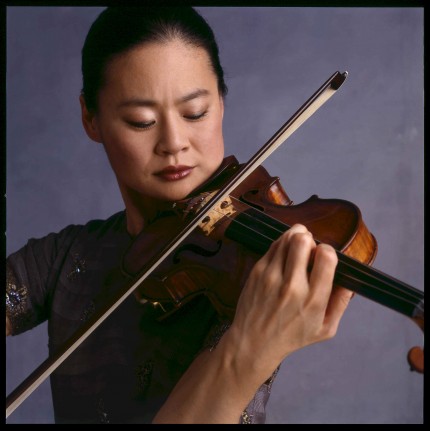Midori brings intimate poetry and refined eloquence to Bach

Midori performed the first of two Bach programs Tuesday night at Ravinia.
For all their popularity and stature as the greatest music ever written for solo violin, Johann Sebastian Bach’s six sonatas and partitas rarely come off wholly successfully, too often played as fiddle showpieces or in an overly reverent manner that slights the music’s range of emotion and communicative essence.
Tuesday night at Ravinia, Midori performed the first of two programs devoted to these six Bach works. More than many, Midori has made a graceful transition from prodigy to seasoned veteran, and her performance delivered a virtual seminar in Bach style with playing that was historically informed, technically immaculate, poetic and individual. The second and concluding program takes place Thursday.
With her confiding approach, Midori immediately drew the Martin Theatre audience in with the intimacy of her playing in the opening Adagio of the Sonata No. 1 in G minor. The violinist brought a flexible pulse and spontaneity to her phrasing, with her rubato and hushed playing leading the ear on to the next bar.
The Fuga was rhythmically incisive without sacrificing galant period elegance. She brought a gentle wistful charm to the Siciliano and, playing with her restless physical motion, threw off the challenges of the concluding Presto in exciting, technically faultless style without ever taking the music out of period.
Yet for all the refinement and gracious manners of her Bach, Midori’s playing was often bracingly individual in surprising ways. In the Sonata No. 3 in C major, she firmly accentuated the repeated note in the counter-melody of the opening Adagio, adding a tense, throbbing quality to the usual stately reverie. Likewise, her freedom of phrasing and pulse brought an almost jazz-like swagger to the Fuga. The Largo was a highlight of the evening, rendered with an inner glow and hushed expression that conveyed that strange blend of sadness and solace at the heart of so much of Bach’s music.
The evening concluded with the Partita No. 2 in D minor. After the inward musing of the opening Allemande, the violinist’s lightly bowed Courante and Gigue bought out the dance inflections in lilting graceful fashion. Once again, the slow section brought out some of her finest and most communicative playing, with a deeply expressive, dynamically refined Sarabande.
Bach’s mighty Chaconne, which concluded the Second Partita and the program, provided the only grounds for critical cavil. While Midori’s playing was as committed and technically gleaming as before, her account of this Everest of violin music seemed a bit offhand and small scale, not quite conveying the gravitas, dramatic weight or sense of struggle in conquering this summit of Bach’s violin oeuvre.
That apart, this was a magisterial evening of Bach, played with unerring intelligence, sensitivity and taste by one of the finest violinists of our day. Do try to catch the second installment on Thursday.
Midori performs Bach’s Sonata No. 2 and Partitas Nos. 1 and 3 at 8 p.m. Thursday at Ravinia’s Martin Theatre. ravinia.org